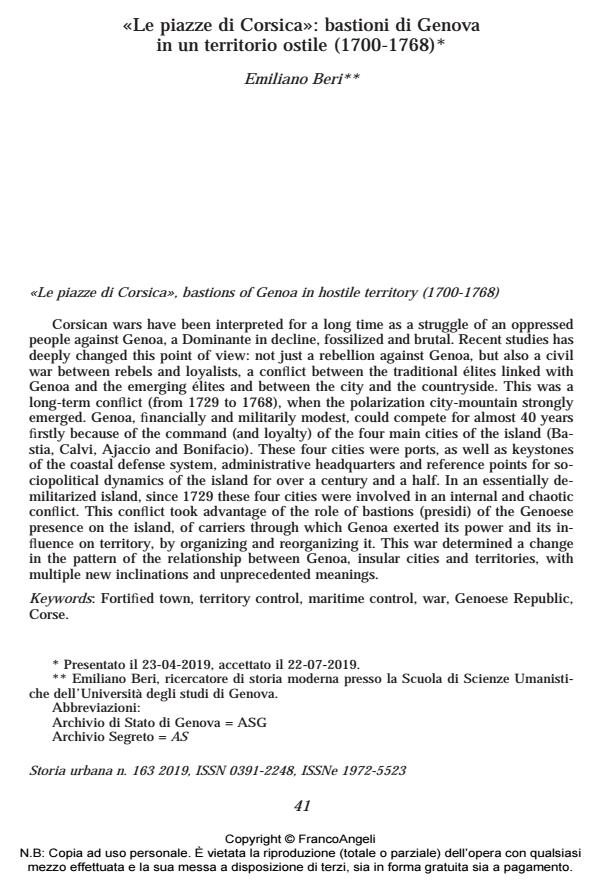«Le piazze di Corsica», bastions of Genoa in hostile territory (1700-1768)
Journal title STORIA URBANA
Author/s Emiliano Beri
Publishing Year 2020 Issue 2019/163 Language Italian
Pages 21 P. 41-61 File size 137 KB
DOI 10.3280/SU2019-163003
DOI is like a bar code for intellectual property: to have more infomation
click here
Below, you can see the article first page
If you want to buy this article in PDF format, you can do it, following the instructions to buy download credits

FrancoAngeli is member of Publishers International Linking Association, Inc (PILA), a not-for-profit association which run the CrossRef service enabling links to and from online scholarly content.
Corsican wars have been interpreted for a long time as a struggle of an oppressed people against Genoa, a Dominante in decline, fossilized and brutal. Recent studies has deeply changed this point of view: not just a rebellion against Genoa, but also a civil war between rebels and loyalists, a conflict between the traditional élites linked with Genoa and the emerging élites and between the city and the countryside. This was a long-term conflict (from 1729 to 1768), when the polarization city-mountain strongly emerged. Genoa, financially and militarily modest, could compete for almost 40 years firstly because of the command (and loyalty) of the four main cities of the island (Bastia, Calvi, Ajaccio and Bonifacio). These four cities were ports, as well as keystones of the coastal defense system, administrative headquarters and reference points for sociopolitical dynamics of the island for over a century and a half. In an essentially demilitarized island, since 1729 these four cities were involved in an internal and chaotic conflict. This conflict took advantage of the role of bastions (presidi) of the Genoese presence on the island, of carriers through which Genoa exerted its power and its influence on territory, by organizing and reorganizing it. This war determined a change in the pattern of the relationship between Genoa, insular cities and territories, with multiple new inclinations and unprecedented meanings.
Le guerre di Corsica sono state lette per molto tempo come la lotta di un popolo oppresso contro una Dominante decadente, sclerotizzata e brutale. Oggi l’approccio è radicalmente cambiato. Ribellione contro Genova ma non solo, anche guerra civile fra ribelli e lealisti, scontro tra élites tradizionali legate a Genova e élites emergenti e scontro fra città e contado. Uno scontro di lunga durata (1729-1768) in cui la polarizzazione città-montagna (perché il paesano corso è essenzialmente un «montanaro») emerge con forza. Genova, modesta nelle armi e nel fisco, ha potuto giocarsi la partita sotto il profilo militare e politico per quasi otto lustri in primo luogo grazie al controllo delle quattro città principali dell’isola (Bastia, Calvi, Ajaccio e Bonifacio). Centri portuali, sedi dell’amministrazione e punti di riferimenti per le dinamiche sociopolitiche isolane (basate su solide strutture fazionarie a base parentale) per oltre un secolo e mezzo, in un’isola sostanzialmente smilitarizzata, queste quattro città sono state proiettate repentinamente, a partire dal 1729, in un conflitto intestino e caotico. Un conflitto che ne ha valorizzato il ruolo di bastioni della presenza genovese nell’isola, di vettori attraverso cui Genova esercitava potere e influenza sul territorio, organizzandolo e riorganizzandolo. La guerra ha determinato, in sostanza, una mutata configurazione del rapporto fra Genova, le città e il territorio isolani, con nuove molteplici declinazioni e significati inediti.
Keywords: Fortified town, territory control, maritime control, war, Genoese Republic, Corse.
- Las ciudades-fortaleza de Córcega entre revuelta, guerra civil y la Guerra de Sucesión austriaca (1740-1748) Emiliano Beri, in Cuadernos de Historia Moderna /2022 pp.529
DOI: 10.5209/chmo.81681
Emiliano Beri, «Le piazze di Corsica»: bastioni di Genova in un territorio ostile (1700-1768) in "STORIA URBANA " 163/2019, pp 41-61, DOI: 10.3280/SU2019-163003